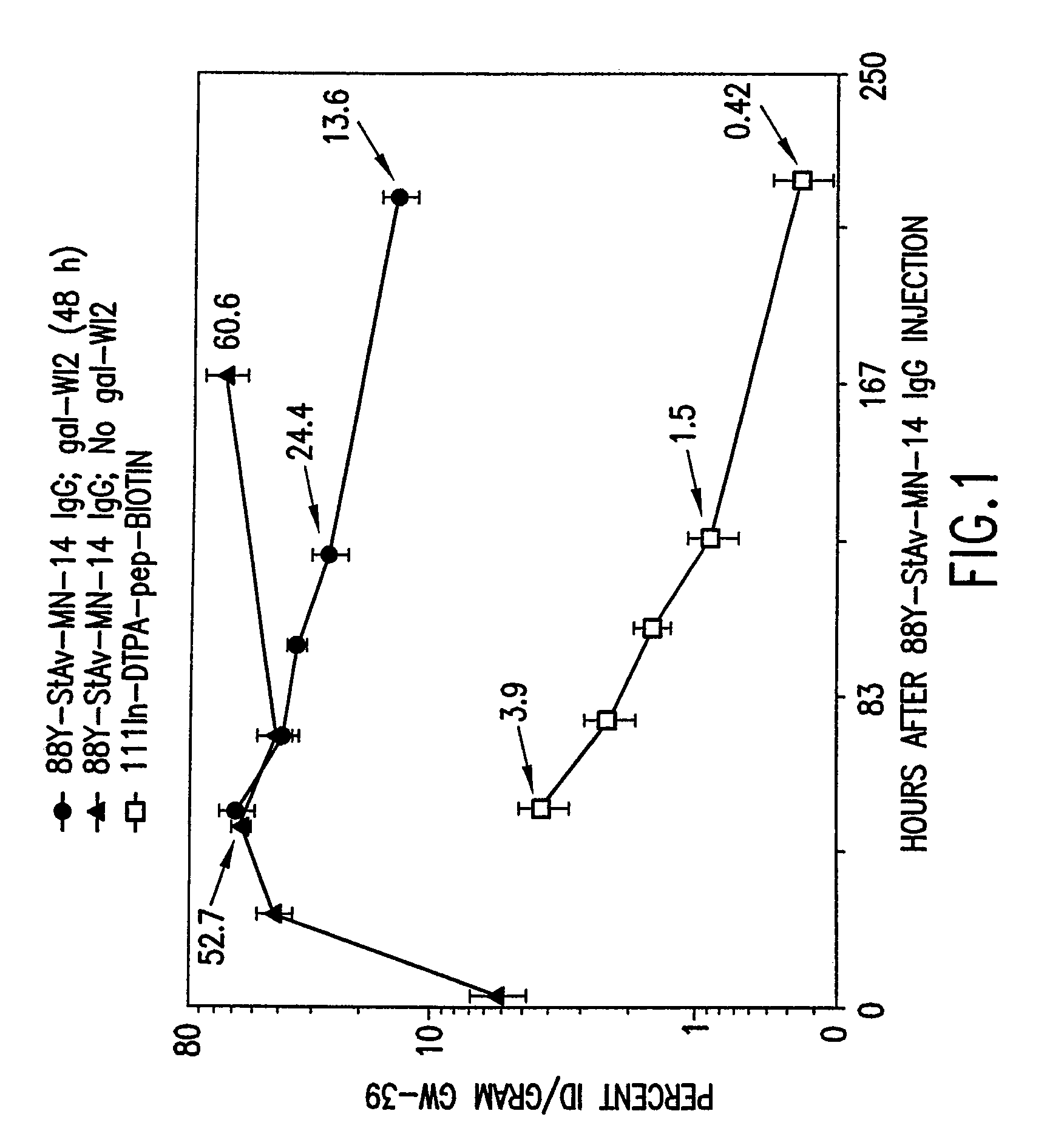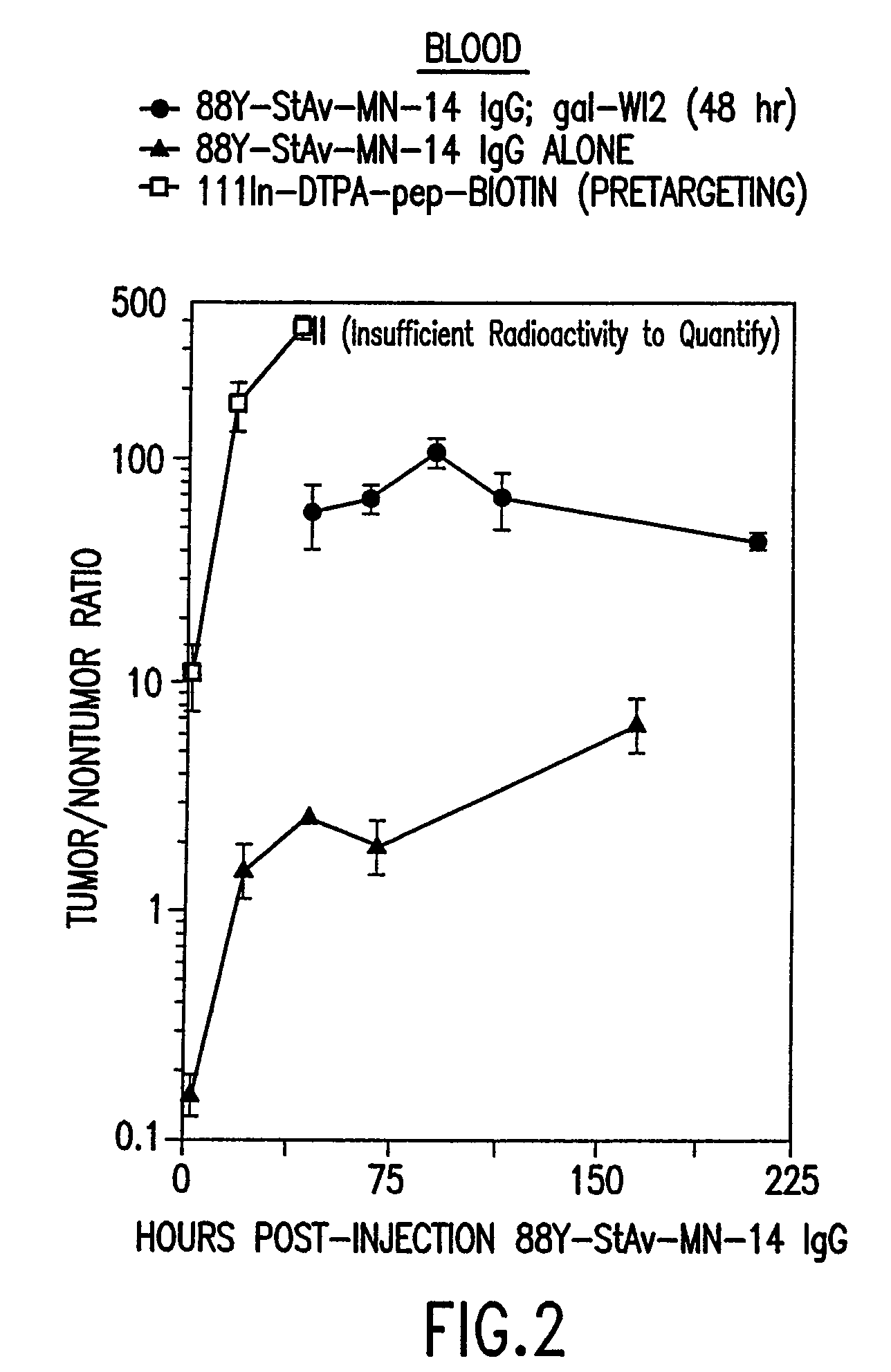Targeted combination immunotherapy of cancer and infectious diseases
a combination immunotherapy and cancer technology, applied in the field of cancer or infectious diseases, can solve the problems of insufficient complete solution of each of these problems, low absolute accretion of antibody in the tumor, unacceptable normal organ toxicity, etc., and achieve the effects of reducing toxic effects, minimizing patient toxicity, and effective and efficient delivery of agents
- Summary
- Abstract
- Description
- Claims
- Application Information
AI Technical Summary
Benefits of technology
Problems solved by technology
Method used
Image
Examples
example 1
[0101]Targeted Double Therapeutic Agents Preferred embodiments of targeted double therapeutic agents that can be delivered utilizing the method of the present invention include but are not limited to the following systems:
[0102](1) I-131-antibody-biotin cleared (and tumor-avidinylated) with neutralized, deglycosylated avidin and targeted secondarily with Y-90-chelate-biotin.
[0103](2) I-131-antibody-biotin cleared with an anti-idiotypic antibody, tumor-avidinylated with neutralized, deglycosylated avidin and targeted secondarily with Y-90-chelate-biotin.
[0104](3) I-131-antibody-streptavidin cleared with an anti-idiotypic antibody and targeted secondarily with Y-90-chelate-biotin.
[0105](4) I-131-antibody-streptavidin cleared with an anti-idiotypic antibody and targeted secondarily with Lu-177-chelate-biotin.
[0106](5) I-131-antibody-streptavidin cleared with an anti-idiotypic antibody and targeted secondarily with camptothecin-biotin.
[0107](6) I-131-antibody-streptavidin cleared with a...
example 2
[0126]Targeting of a CEA-Producing Tumor With Two Different Radionuclides
[0127]Nude mice bearing approximately one week old GW-39 (CEA-producing) human tumor xenografts are treated with an injection of a Y-88-DTPA-MN14 (anti-CEA)-streptavidin radioimmunoconjugate. Forty-eight hours later the animals are treated with a five-fold molar excess (to remaining MN-14 in the circulation) of an anti-idiotypic antibody to MN14; WI2. Three hours later animals are injected with biotin-D-Phe-(epsilon-In-111-Bz-DTPA)-D-LysNH2. After sacrifice and necropsy important tissues are counted separately in a gamma-scintillation counter using energy window settings appropriate for the two radionuclides; which, decaying at very different energies, can therefore be counted simultaneously. FIG. 1 shows the percentage ID / g of both agents in tumor at continuing time-points, while FIG. 2 shows the tumor-to-blood ratios for the reagents. It is found that tumor-to-blood ratios for the subsequently-administered bi...
example 3
[0128]Three-Step Radioimmunotherapy Delivering I-125 or I-131 and Y-90 to Tumor Sites
[0129]In this example a first antibody conjugate which comprises an anti-tumor MAb conjugated to streptavidin (SAv) and radiolabeled with an iodine isotope, such as I-131 or I-125, is administered to a patient.
[0130]After time of maximum tumor accretion, for example, about 24 to about 48 hours, a clearing composition comprising a conjugate of a MAb that is anti-idiotypic to the antibody of the first antibody conjugate is administered. This clearing agent clears first antibody conjugate from circulation.
[0131]The radioiodinated MAb-SAv localized at the tumor sites remains there, irradiating the tumor over very short ranges in the case of I-125 (single cell diameters) or over short to medium ranges in the case of I-131 (optimum range 0.26 to 0.5 cm). The radioiodinated MAb-SAv deposited internally in liver hepatocytes is metabolized and, the radioiodine is released and rapidly excreted from the patien...
PUM
| Property | Measurement | Unit |
|---|---|---|
| diameter | aaaaa | aaaaa |
| diameter | aaaaa | aaaaa |
| diameter | aaaaa | aaaaa |
Abstract
Description
Claims
Application Information
 Login to View More
Login to View More - R&D
- Intellectual Property
- Life Sciences
- Materials
- Tech Scout
- Unparalleled Data Quality
- Higher Quality Content
- 60% Fewer Hallucinations
Browse by: Latest US Patents, China's latest patents, Technical Efficacy Thesaurus, Application Domain, Technology Topic, Popular Technical Reports.
© 2025 PatSnap. All rights reserved.Legal|Privacy policy|Modern Slavery Act Transparency Statement|Sitemap|About US| Contact US: help@patsnap.com


